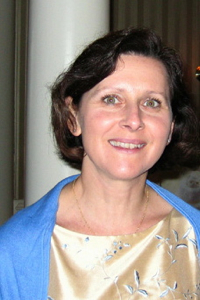Canuel selected as Leopold Fellow
Professor Elizabeth Canuel of the Virginia Institute of Marine Science is among 20 environmental scientists from the U.S., Canada, and Mexico who have been awarded a prestigious Aldo Leopold Leadership Fellowship for 2011.

As a Leopold Fellow, Canuel will participate in two intensive week-long training sessions—one on and around Capitol Hill—designed to promote effective communication of science to citizens, policymakers, the business community, and other non-academic audiences.
The Leopold program, based at Stanford University's Woods Institute for the Environment, is named after the influential American conservationist Aldo Leopold, who helped lead the movement for wilderness preservation in the United States. Leopold is author of A Sand County Almanac, one of the classics of American environmental literature.
Professor Pamela Matson, scientific director of the Leopold program and dean of Stanford’s School of Earth Sciences, says “Academic scientists work hard to understand environmental problems and develop potential solutions, but to solve problems requires communication and a two‐way flow of information between scientists and decision makers. The Leopold Leadership Program trains academics to close the gap between knowledge and action.”
Canuel is a marine geochemist who uses chemical "signatures" within environmental samples to better understand how human activities modify the carbon cycle in the coastal zone. Her work has focused on two of the nation’s largest and most troubled estuaries—Chesapeake Bay and San Francisco Bay.
Canuel says her interest in applying for Leopold training stems from her recent involvement in the Chesapeake Algal Project—a collaborative effort to harvest wild algae from Chesapeake Bay for use as a biofuel—and her desire to train her own and other graduate students at VIMS in effective science communication.
“I applied for the fellowship because I wanted to make my science more relevant to broad audiences,” say Canuel. “Working on our biofuels project—with policymakers and people from the community, industry, and the business sector—has really opened my eyes to the importance of having skills that will help me translate my research findings into solutions for environmental problems.”
During the first weeklong training session, Canuel and the other Leopold fellows will work with media representatives and communication specialists to enhance their skills in communication, outreach, and leadership. The session will include "hands on" training that includes mock interviews and writing exercises for different audiences.
The second session, focusing primarily on interactions with policy makers, industry, and non-governmental organizations (NGOs), will be held in Washington, D.C. Fellows will make appointments to meet with key leaders from government agencies, international organizations, business, and Congressional offices.
Canuel will be the third VIMS researcher to take part in Leopold training, following in the footsteps of professors Emmett Duffy and Rom Lipcius, who were selected as Leopold fellows in 2006.
VIMS Dean and Director John Wells says the selection of VIMS researchers as Leopold fellows “reflects both the relevancy of the science we do here at VIMS, and our scientists’ admirable desire to communicate and apply their knowledge to solving the problems that face Chesapeake Bay and our coastal ocean.”
Other recipients of 2011 Leopold fellowships hail from Arizona State University, Duke University, McGill University, Oregon State University, Stanford University, the University of Calgary, University of Florida, University of Hawaii, University of Maryland, University of Michigan, University of Minnesota, Universidad Nacional Autónoma de México, University of North Carolina at Chapel Hill, University of Notre Dame, and the University of Wisconsin-Madison.
Leopold fellows are selected through a competitive application process open to mid-career academic environmental scientists throughout North America. They are expected to use their training to enhance their professional activities both within and outside the scientific community, and to incorporate components of the training into their undergraduate and graduate courses and other outreach activities.
Following her training, Canuel will join Duffy, Lipcius, and other fellows in the Leopold Leadership Network, a developing "community of practice" of academic scientists and past fellows who are skilled communicators of scientific information to policy makers and other non-scientists on a wide range of pressing environmental issues.
The Leopold program was founded in 1998 by Jane Lubchenco, now director of the National Ocean and Atmospheric Administration (NOAA). Funding for the program comes from the David and Lucile Packard Foundation.
